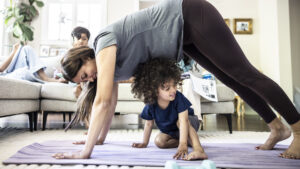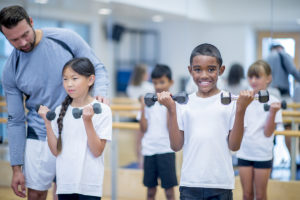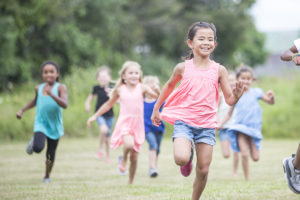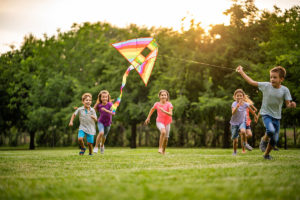Family Meals, Healthier Futures: The Power of Cooking Together
Home-prepared meals play an important role in shaping children’s nutrition. Studies consistently link family cooking with higher diet quality, including more fruits, vegetables, and whole foods, though evidence that it…
Parent Modeling: the Most Powerful Influence on Family Fitness Day
Kids often mirror the habits they see. When parents make time for exercise, choose to walk instead of drive, or celebrate effort over performance, children are more likely to grow…
Family Fitness: Fun Ways to Move Together
When families move together, exercise shifts from a chore into a memory. Kids are more likely to embrace active habits when parents make movement visible and enjoyable, and parents benefit…
Strength That Moves: Why Kids Need Power for Sport
Strong kids move better. Research shows that youth resistance and neuromuscular training can significantly improve sprinting, jumping, and change-of-direction skills, while also lowering the risk of sport-related injuries when paired…
Foundations First: A Smarter Start to Strength for Kids
The best way for kids and teens to begin strength training is by focusing on bodyweight exercises and light tools like resistance bands or medicine balls. Early sessions should include…
Implementing Kids’ Fitness in Your Studio
Today’s children face a critical health crossroads. On one hand, decades of research confirm that regular physical activity builds stronger hearts, bones, and muscles while also supporting mental health, academic…
Myth-Busting: “Strength Training Stunts Growth in Kids”
For decades, parents and coaches worried that weightlifting or resistance training might “stunt” a child’s growth. This myth has been repeated so often that many families still hesitate to let…
Digital Wellness: Balancing Screens with Movement
Screens are here to stay. Between online learning, gaming, texting friends, and streaming shows, digital devices have become woven into children’s daily routines. While technology can be educational and entertaining,…
Mind-Body Practices in Youth
In recent years, yoga and mindfulness have moved beyond gyms and studios to become part of classrooms and after-school programs. The appeal is clear: these practices train self-regulation, while also…
Children’s Mental-Wellness Dividends from Exercise
Movement isn’t just about stronger muscles. It’s also a powerful booster for emotional and cognitive health in children and adolescents. Mental-Wellness Benefits Across the Board A recent umbrella review and…
Pediatric Recommendations: The 60-Minute Rule
Health authorities agree on one simple but powerful guideline for children’s well-being: daily movement. For ages 6–17, the recommendation is at least 60 minutes per day of moderate-to-vigorous physical activity…
School Integration: Movement Breaks That Boost Learning
Integrating physical activity into the school day is increasingly recognized as a way to enhance, not detract from, academic achievement. Short “brain breaks” and physically active lessons can provide students…
Physical Activity as Prevention for Kids
Regular movement in childhood is one of the most effective “vaccines” we have against lifelong disease. When children consistently meet daily activity guidelines, they experience improvements in cardiorespiratory fitness, stronger…
Strong Foundations in Children’s Fitness and Wellness
Children’s fitness and wellness are among the most important yet overlooked foundations of lifelong health. While youth face a wide range of modern challenges; from increased sedentary time and digital…
Fit Preschoolers and Brain Fitness
Encourage restless kids to run, jump and play. Not only is it good for their bodies, it’s also good for their minds. Active pre-school children demonstrate better working memory, less…













